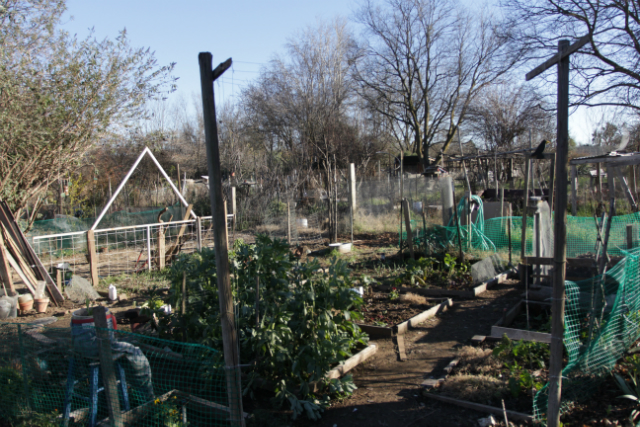Beginning in 2004, University of California campuses have offered the Education for Sustainable Living Program (ESLP). The program arrived at UC Davis in 2008, and has been taught every Spring Quarter since then.
The primary program involved in ESLP’s initiation is the ASUCD Campus Center for the Environment (CCE).
“Though the class was run by a dedicated group of students up until 2011, CCE has since incorporated the coordination of the class into the Sustainability Research and Education Coordinator position … We work to incorporate a variety of sustainability-related departments, individuals, clubs and organizations into the class through lectures and Action Research Teams,” said Tessa Artale, last year’s CCE unit director and a fourth-year spanish and sociology double major, in an email interview.
Lucas Hill and Emili Abdel-Ghany are this year’s Sustainability Research and Education co-coordinators for the CCE.
ESLP is sponsored by many other programs such as the John Muir Institute for the Environment, ASUCD Environmental Policy and Planning Commission (EPPC), Agricultural Sustainability Institute, Society for Conservation Biology, Geology Graduate Group, the ASUCD executive Office, Go Green Grant and the Student Assistants to the Chancellor, according to Abdel-Ghany, who is ESLP’s student coordinator and a third-year environmental policy, analysis and planning major.
According to a 2011 ESLP syllabus, program participants will interact with community members and various members of the faculty and administration, and will aim to implement tangible change in the community.
The structure of the seminar involves weekly guest lecturers and tentative speakers from different organizations such as Kijani Grows, which develops aquaponics and hydroponic gardens, as well as the International Forum on Globalization and 5 Gyres Institute.
“I think that it would be a good way to increase awareness of the benefits of living sustainably (it would not only save the environment but possibly save some people a few dollars on utilities and such). Getting people involved would be best, but it’s even better to be informed beforehand,” said second-year food science major Jason Wang.
According to Abdel-Ghany, speakers are encouraged to have at least 30 minutes to one hour of discussion with the class and are encouraged to integrate collaborative and experiential learning into the curriculum.
According to Artale, the speakers for ESLP are chosen by students from campus organizations, CCE staff members and the ESLP planning team. Potential speakers include those who have spoken before, those who can provide a new perspective on the understanding of sustainability, activists making positive changes in their communities and those they want to learn more about.
“I hope students gain a more well-rounded, comprehensive understanding of the term ‘sustainability’ and the many facets it encompasses, from social justice to indigenous perspectives to practical, everyday applications of living a conscious lifestyle,” Artale said.
This two-unit seminar will be held on Wednesdays from 3:10 to 5 p.m. in Hutchison 115 as American Studies 198. Those interested in taking the seminar may enroll with the Course Registration Number (CRN) 30813.
“ESLP provides a platform for engaging students in their education in a way that works best for them and leaves them with tangible life knowledge that they will hopefully remember for the rest of their lives,” Abdel-Ghany said. “This class means very much to me and I hope that my passion translates into a beautiful and meaningful experience for all involved.”
LILIANA NAVA OCHOA can be reached at campus@theaggie.org.









